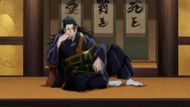In Jujutsu Kaisen, Suguru Geto is one character who was robbed of happiness because of society. He didn’t begin as a villain or someone intoxicated by power—rather, he began as a hero. A protector. A man driven by moral duty to safeguard the weak.
But Geto’s journey in Jujutsu Kaisen is one of gradual decay, of a man with a savior complex whose ideals were slowly dismantled until all that remained was bitterness, disgust, and a radical philosophy that turned him into one of the series’ most dangerous antagonists.
From the beginning, Geto exhibited a messianic tendency as he believed that, as a sorcerer, it was his duty to protect non-sorcerers from cursed spirits. In fact, Geto didn’t just see jujutsu sorcerers as powerful warriors; he saw them as divine instruments of peace. His robe, styled after the kesa worn by Buddhist monks, is the first visual sign that Geto likened his role to that of a spiritual savior.

In Jujutsu Kaisen: Volume 0, he pretends to be a benevolent healer, "curing" non-sorcerers and being revered as a holy man. One woman even compares him to Buddha. And the tragedy in this scene is that he agrees with her sentiment, despite calling non-sorcerers “monkeys.”
This moment cements him as a perverse mirror to Gojo Satoru. Where Gojo becomes the honored one—a title drawn directly from Buddhist enlightenment—Geto becomes a twisted version of that ideal, someone who mimics spiritual transcendence while sinking into moral darkness.
Even the art in Jujutsu Kaisen Chapter 70 frames him as a messianic figure. He stands in the vitarka mudra pose. This symbolizes the transmission of divine knowledge, while the curses kneel and pray beneath him. The imagery is unmistakable: Geto believes he’s found a higher truth, and now he’s a prophet of it. Only his gospel preaches death to non-sorcerers.
Geto vs. Gojo: Diverging Philosophies of Power and Purpose

What truly divides Geto and Gojo isn’t strength. Although Gojo is undoubtedly the strongest, but philosophical. Geto believes that sorcerers exist for something. That their power means responsibility. Gojo, on the other hand, believes power is neutral; it is the wielder who assigns it meaning.
To Geto, jujutsu was moral. It had an inherent purpose—to protect the weak. But Gojo sees power as just another tool, one that becomes good or evil depending on the user. This difference might seem subtle, but it's monumental. Geto cannot separate his power from his burden. Gojo, meanwhile, can choose how to wield his.
Their contrasting approaches become evident during the mission to protect Riko Amanai—the Star Plasma Vessel. While Gojo treats it more like a job, Geto shows genuine empathy, arranging for Riko to enjoy her final days before her destined sacrifice. He considers her emotions, her desires, her right to choose. But when Riko is killed by Toji Fushiguro, and Geto is too weak to stop it, something inside him shatters.
How did encountering Toji make Geto start questioning everything?

Toji Fushiguro was no sorcerer. He had no cursed energy. He was, in Geto’s own words, a "monkey." Yet he nearly killed both Geto and Gojo. And it was this paradox that began to unravel Geto's worldview.
What shook Geto even more was the reaction of the very people sorcerers were meant to protect. The Star Plasma cultists, instead of mourning Riko’s death, smiled at the tragedy. They applauded the failure. They rejoiced in the bloodshed.
Witnessing this, Geto began to unravel. The lines blurred between who deserved protection and who didn’t. And as that line faded, so did his conviction. If he could no longer tell who was worth saving, then the purpose of saving anyone at all came into question.
Even in the end, Geto still has valid reasons in Jujutsu Kaisen

The tragedy of Suguru Geto in Jujutsu Kaisen is that he doesn’t descend into madness randomly. Every belief he forms is the result of logic—twisted logic, yes, but logic nonetheless. He was a man who believed in self-affirmation, who needed to know that what he was doing was right.
But the world of Jujutsu Kaisen broke him. It disproved every moral he held dear. It laughed at his compassion. It killed the people he tried to save and celebrated their deaths. He tried to protect the weak, and the weak spat in his face. In the end, he still believed he was saving someone. He just redefined who that “someone” was.
